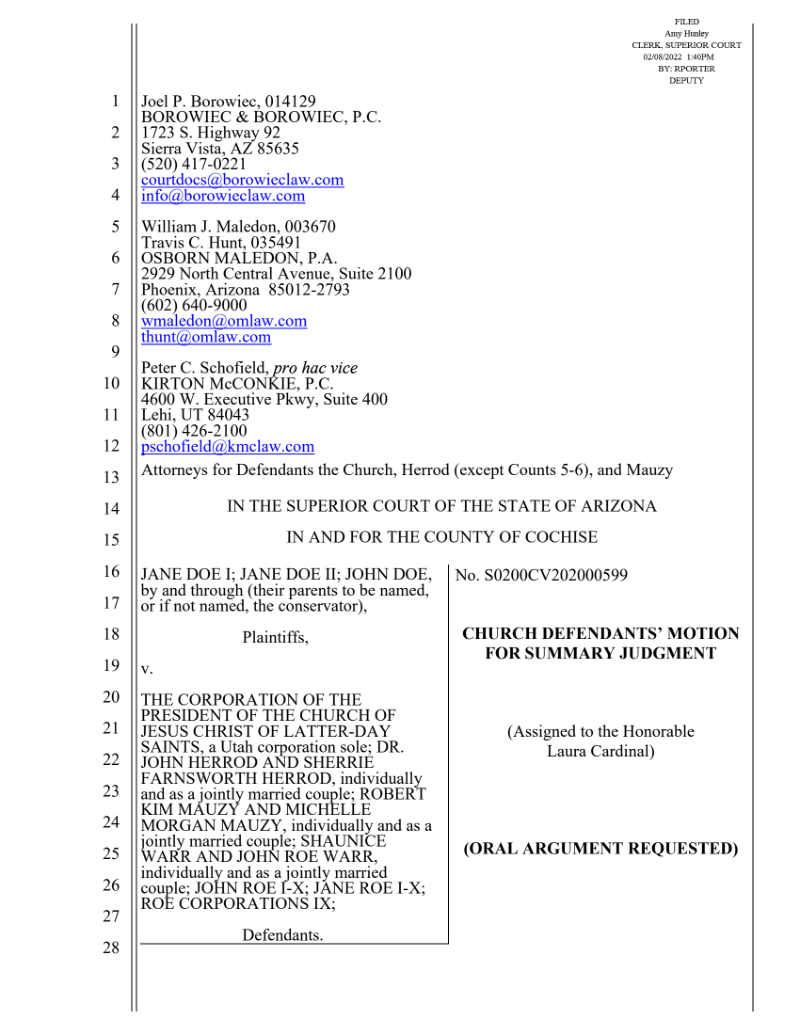Motion for Summary Judgement for 2021 civil case against the Church over sexual abuse in Bisbee, Arizona.
- Type
- Speech / Court Transcript
- Source
- William Maledon
- Hearsay
- Direct
- Reference
JANE DOE I et al. Plaintiffs, vs. THE CORPORATION OF THE PRESIDENT OF THE CHURCH OF JESUS CHRIST OF LATTER-DAY SAINTS et al., SUPERIOR COURT OF THE STATE OF ARIZONA IN AND FOR THE COUNTY OF COCHISE, No. S0200CV202000599, THE CHURCH DEFENDANTS' MOTION FOR SUMMARY JUDGEMENT, FEBRUARY 2022
- Scribe/Publisher
- Superior Court of the State of Arizona In and For the County of Cochise
- People
- Leizza Adams, Paul Adams, John Herrod, William Maledon, Laura Cardinal, Shaunice Warr, The Church of Jesus Christ of Latter-day Saints, Robert Kim Mauzy
- Audience
- Cochise county
- Transcription
. . .
INTRODUCTION
This case hinges entirely on whether Arizona’s child abuse reporting statute, A.R.S. 13-3620, required two Church Bishops, Defendants John Herrod and Kim Mauzy, to report to authorities confidential confessions made to them by Plaintiffs’ father. If it does not, then Plaintiffs’ claims fail because Plaintiffs have no basis to contend that the Church Defendants otherwise owed them a duty. And “the existence of a duty to the plaintiff is a prerequisite to tort liability.” Noble v. Nat’l Am. Life Ins. Co., 128 Ariz. 188, 191 (1981). Whether a duty exists is a question of law for the Court. Gipson v. Kasey, 214 Ariz. 141, 145, ¶¶ 19-21 (2007).
The Arizona reporting statute requires certain defined “persons” to report child abuse. But it contains an explicit exception for clergy who learn of abuse from “a confidential communication or a confession” if “the member of the clergy . . . determines [it] is reasonable and necessary within the concepts of the religion” to keep the communication confidential. A.R.S. 13-3620(A). Thus, clergy do not have to breach their religious duty of confidentiality. Here, it is undisputed that, whatever Paul Adams confessed to these two Church Bishops, he did so in confidence. It is also undisputed that both Bishops had no other information about the abuse, and that both determined those confessions had to remain confidential “within the concepts of the[ir] religion.” (See Declarations of John Herrod and Kim Mauzy attached hereto as Exhibits 1 and 2.) As a matter of law, Plaintiffs cannot second-guess that religious determination by these clergy members, nor can they ask this Court or a jury to do so. Thus, the Church Defendants are entitled to summary judgment as to all of Plaintiffs’ claims.
. . .
- Citations in Mormonr Qnas
The B. H. Roberts Foundation is not owned by, operated by, or affiliated with the Church of Jesus Christ of Latter-day Saints.

